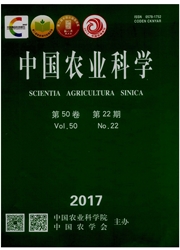

 中文摘要:
中文摘要:
【目的】番木瓜(Carica papayaL.)是具有雌性、雄性和兼性性别分化,在热带和亚热带广泛种植的果树作物。番木瓜植株性别的早期确定对果园的建立具有重要意义。【方法】通过对与番木瓜性别连锁AFLP分子标记的克隆、测序和PCR引物设计,将31个与番木瓜性别连锁的AFLP分子标记转化为SCAR标记,并在具有不同性别分化的番木瓜植株和分离群体上进行验证。【结果】有16个SCAR标记在番木瓜雌性、兼性和雄性植株DNA样品上可扩增出多态性,在F2代分离群体上均与兼性性别共分离,可以有效地区分雌性株和兼性株或雄性株;另有15个SCAR标记在雌性、兼性和雄性植株DNA样品上没有扩增出多态性,不同性别DNA样品均扩增出相同大小的DNA片段。【结论】这些AFLP转化来的SCAR标记既可以作为与番木瓜性别连锁的分子标记进行早期性别分子诊断和分子标记辅助育种,又可以作为探针筛选番木瓜大片段基因组BAC文库,构建性别控制基因染色体区域的物理图谱。
 英文摘要:
英文摘要:
[ Objective ] Papaya (Carica papaya L.), native to tropical America, is a widely distributed fruit crop throughout the tropical and warmer subtropical regions of the world. Papaya is a polygamous plant species with three sex forms: female, male, and hermaphrodite. Sex determination in the young seedling stage is very important for papaya plantation. [Method] By cloning sex-linked AFLP markers, 31 Carica papaya sex linked SCAR markers were developed and validated at different sex types of papaya plants and segregation population. [Result] Sixteen SCAR markers were found to be polymorphic between different sex types and were co-segregated with male and hermaphrodite sex, and therefore can be used to discriminate the female and hermaphrodite or male tree, while the other 15 SCAR markers were monomorphism yielding same size DNA fragments at three sex types. [Conclusion] These AFLP-derived SCAR markers can be used as diagnostic tools for molecular discrimination of different papaya sex types at seedling stage and as probes to screen papaya BAC library to construct physical map around the papaya sex determination gene.
 同期刊论文项目
同期刊论文项目
 同项目期刊论文
同项目期刊论文
 Molecular identification of a new powdery mildew resistance gene Pm41 on chromosome 3BL derived from
Molecular identification of a new powdery mildew resistance gene Pm41 on chromosome 3BL derived from A‘one-marker-for-two-genes’ approach for efficient molecular discrimination of Pm12 and Pm21 conferr
A‘one-marker-for-two-genes’ approach for efficient molecular discrimination of Pm12 and Pm21 conferr Identification of Differentially Expressed Genes in Leaf and Root between Wheat Hybrid and Its Paren
Identification of Differentially Expressed Genes in Leaf and Root between Wheat Hybrid and Its Paren Identification and genetic mapping of pm42, a new recessive wheat powdery mildew resistance gene der
Identification and genetic mapping of pm42, a new recessive wheat powdery mildew resistance gene der 期刊信息
期刊信息
